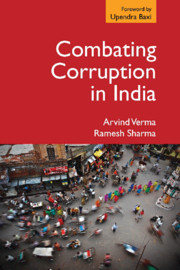Book contents
- Frontmatter
- Contents
- List of Tables and Figures
- Acknowledgements
- Foreword
- 1 Introduction
- Part I Corruption in India
- Part II Combating Corruption in India
- 4 Anti-Corruption Machinery: CVC and CBI
- 5 Evaluating Efficacy of Anti-Corruption Agency: Case Study from Madhya Pradesh
- 6 Lokpal and Lokayukta: A Critical Examination
- Part III Way Forward: Alternate Solutions
- Bibliography
- Index
5 - Evaluating Efficacy of Anti-Corruption Agency: Case Study from Madhya Pradesh
from Part II - Combating Corruption in India
Published online by Cambridge University Press: 13 November 2018
- Frontmatter
- Contents
- List of Tables and Figures
- Acknowledgements
- Foreword
- 1 Introduction
- Part I Corruption in India
- Part II Combating Corruption in India
- 4 Anti-Corruption Machinery: CVC and CBI
- 5 Evaluating Efficacy of Anti-Corruption Agency: Case Study from Madhya Pradesh
- 6 Lokpal and Lokayukta: A Critical Examination
- Part III Way Forward: Alternate Solutions
- Bibliography
- Index
Summary
Case Study of EOW Madhya Pradesh
We conduct an important empirical case study about a major anti-corruption and anti-economic offences unit and its functions from one of the largest states of India. Our objective is to present statistical evidence that even when an anti-corruption agency is run professionally and efficiently, it is not able to curb corruption to any significant extent. The Madhya Pradesh (MP) government, over successive decades, took a number of innovative and promising steps to strengthen the Economic Offences Wing (EOW), empowering it with progressive legislations, administrative measures and providing resources of personnel, technical support and requisite infrastructural facilities. We examine the structure, powers and enabling legislations and assess the ability of such an empowered unit to combat corruption in the state. A major part of this examination is done through specific case studies to illustrate its success and limitations. Furthermore, a detailed empirical examination of the assiduously collected unique official data for 13 years (2000–12) has been carried out to assess the nature and problems of investigation and prosecution of corruption cases. Such a detailed examination of real and comprehensive data provides an in-depth understanding of what one can term the functioning of a representative anti-corruption agency and the extent of its ability in tackling and curbing corruption effectively.
Evolution of EOW MP
Long before the anti-graft movement came into focus in India and at a time when there were still plenty of admirable, honest and committed political leaders and bureaucrats around in the 1970s, Madhya Pradesh was a pioneer state in visualizing and conceiving a single specialized agency to combat corruption and economic offences simultaneously. The police leadership proposed for a single agency on grounds that a majority of the economic offences under the Prevention of Corruption Act (PCA), 1988, other relevant sections of the IPC and other minor Acts involved similar modus operandi and set of offenders. Accordingly, it was prudent to combine the various roles performed by a single agency. BM Shukla, a former IPS officer and then advisor to the Government of MP, had earlier conceptualized a ‘Special Wing’ of the police under the Home Department with the avowed objective of collecting intelligence and investigating serious type of such offences against society.
- Type
- Chapter
- Information
- Combating Corruption in India , pp. 116 - 172Publisher: Cambridge University PressPrint publication year: 2018



